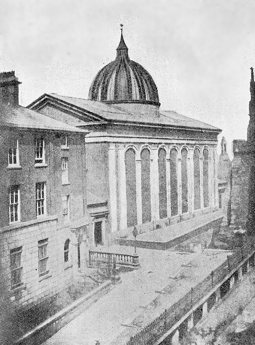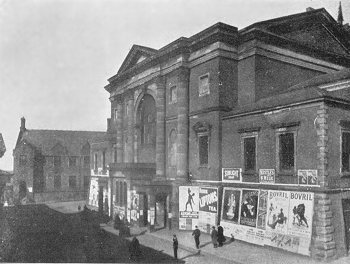The Wolverhampton Exchange The Wolverhampton Exchange Company was provisionally registered in the year 1850 with a capital of £5,000 in shares of £10 each, with a deposit of 1/- per share. The prospectus sets out the advantages of such a building to agriculturists and corn merchants, and adds that "the approaching railways to the counties of Worcester, Hereford, and Salop will complete a chain of circumstances that will shortly render the market of Wolverhampton second to none in the Empire." The Provisional Committee consisted of the then Mayor (G. B. Thorneycroft. Esq.), Chairman; Mr. W. F. Fryer, Deputy-Chairman; Mr. Evans, Dr. Mannix, Mr. W. Taylor, Alderman H. Walker, Messrs. B. Savage, J. Wilson, T. Evans, D. Banton, R. S. Walker, Hartley, W. T. Riley, R. H. Walker, Chambley, Austin, H. Duncalfe, J. Jones, John Sidney, and Alderman Neve. The first call upon the shareholders was made in January, 1850, as is shown by the following:- Wolverhampton Exchange Company Credit this 17th day of January, 1850, Mr. John Mortiboy, the sum of £15, being the first call of £3 per share on five shares in the above company. For Messrs. R. and W. F. Fryer, £15. J. Toovey. The site of the building cost £1,250, and the plans of Mr. Robinson, architect, and the tender of Messrs. Lilley for building, were accepted, and the necessary capital having been subscribed the building was immediately proceeded with; but misfortune soon occurred, for at a directors' meeting of 10th July, 1851, it was resolved that Mr. Ewan Christian, architect, of No. 6, Bloomsbury Street, London, be requested to inspect the building, and to report as to the means of making it absolutely safe, and a few years afterwards the dome was removed.
WOLVERHAMPTON EXCHANGE COMPANY, LIMITED. Six per cent. Preference Shares. 100, Darlington Street, 30th September, 1878. Dear Sirs, I beg to enclose you cheque value £2 18s.9d., being £1 10s. for payment of one year's dividend, to 1st July, 1878, less Income Tax, upon the five six per cent. £5 preference shares, held by you in this company, and £1.10s. for arrear of dividend for the year ending July 1st, 1854, upon such shares, and I shall feel obliged by your signing and returning the annexed receipt for same to me. Yours obediently, WM. MANBY, Managing Director. To Mr. Wm. Mortiboy and Co., Executors. In 1875, on the death of Mr. George F. Manby, the Secretary of the Company, his father, the late Mr. Wm.Manby, who had been a director of the Company since 1853, was appointed managing director, and he continued to be associated with the Company until its liquidation, but in 1884 Mr. Arthur Malling Manby was appointed Secretary. Mr. McGregor succeeded Mr. Hand as lessee, but in 1883 he gave up possession and the directors being unable to find a satisfactory tenant, carried on the building themselves, with the assistance subsequently of Mr. Charles Shaw, architect; but in 1888, it being reported that no less than £900 was owing to the mortgagee for arrears of interest, it was resolved to liquidate, and Mr. A. M. Manby was appointed liquidator. The building was offered for sale by auction on 21st.November, 1888, but the highest bid was £3,500, and it was accordingly withdrawn, and the mortgagee, who was then represented by Mr. Howard Mander, took possession, and a dividend of 5s. in the £ was paid to the creditors. Mr. Mander carried on the Exchange until the year 1898, when he sold it to the Wolverhampton Corporation for £2, 500, the conveyance containing a covenant, which was a condition of the sale that the building should be demolished within six months, and the land levelled, railed off, and paved. The old Exchange was the scene of many interesting and festive gatherings, and witnessed the swearing-in of the first Wolverhampton Volunteers, whilst the annual Bachelors' and Benedicts' Balls were held there till its demolition, and it is a matter of considerable question whether the town has derived any benefit from an aesthetic or a practical point of view by its removal. The pictures of Mr. G. B. Thorneycroft and Mr. Giffard, the late squire of Chillington, which had been painted by public subscription and hung in the large hall, were handed over by the Secretary of the Company to the Corporation, and the former now hangs in the Council Chamber of the Town Hall and the latter in the Sessions Court. The only other known relics of the building are the old stone fireplace which serves as an ornamental arch in the garden of Mr. Berwick Cope at Tettenhall Wood, and the carved oak entrance door of the large hall, which exists in the shape of a mantel and chimney-piece at Bilbrook Manor House. The Wolverhampton Chronicle of February 21st, 1852, contains the following:- The Ball at the Exchange On Friday last, Wolverhampton was enlivened by one of the most effective and well appointed balls that has ever taken place in this county. The ball which has for some time past been announced in aid of the funds of the South Staffordshire Hospital. Nearly four hundred of the elite of the town and neighbourhood were present, and the beauty, rank, and fashion of the guests such as has rarely, if ever, been equalled in this locality.
Messrs. Parker and Mercerot (who kindly gave their services gratuitously, performed their duties as masters of the ceremonies with their usual ability, and the general arrangements gave universal satisfaction. The supper, supplied by Mr. Lisseter, of Birmingham, was all that the most fastidious could require. Amongst the company were Lord and Lady Wrottesley, the Hon. Arthur and Miss Wrottesley, the Hon. the Misses Hill, Mrs. Holyoake, Mr. Monckton (Somerford), General and Mrs. Monckton, Mr. Mrs. and the Misses Pole Shaw, Captain Smythe, Mr. Charles Giffard, Mr. John Mytton, Miss Hinckes and party, Captain Broughton, 3rd Dragoon Guards, and the Misses Broughton, Mr. J. D. H. Hill, 3rd Dragoon Guards, Mr. and Mrs. W. F. Fryer, Mr. and Mrs. Rupert Kettle, Mr. W. Briscoe, Mr. R. Briscoe, Mr. and Mrs. Thomas Walker and party, Mr. W. Warner, Mr. and Mrs. R. Warner, Mr. John Neve and party, Mr. W. Walker and party, Mr. T. M. Phillips, Mr. William Phillips, Mr. Talbot Cartwright and party, the Misses Thurstans, Mr. C. F. Clark and party, Mr. Ironmonger and party, Mr. Arthur Sparrow, Mr. William Sparrow and Miss Rogers, Mr. and Mrs. T. Fowke, Colonel Hogg, Mr. Thomas Pemberton and Miss Pemberton, Mr. Samuel Pemberton and party, Mr. C. F. Sparrow, Mr. and Mrs. Cholditch and party, Mr. C. E. Molineux, Mr. and Mrs. Manby, Mr. T. Hazlehurst and party, Mr. and Mrs. Lea (the Wergs). Pratt's celebrated London Quadrille Band played some of the newest and most popular polkas, waltzes, etc., and by the kindness of Major Dyson and the officers of the 3rd Dragoon Guards, their very able and efficient band poured forth at intervals during the evening strains of enlivening and spirit-stirring music. We are indebted to Major A. M. Manby for particulars of the old Exchange; also to Mr. J. Mortiboy Taylor for credit note and notice of dividend referring to shares, and for a cutting from the Wolverhampton Chronicle. |





